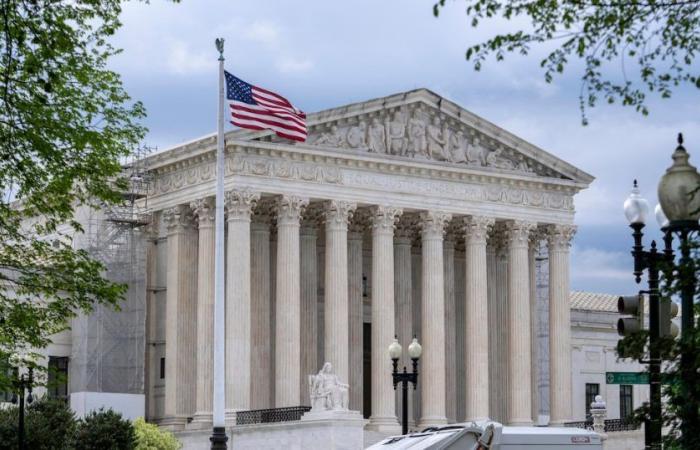WASHINGTON – The Supreme Court of U.S heard this Thursday, 25th, the request for “absolute immunity” for donald trump. And his lawyer supported his thesis to the fullest. Asked by the judges about hypothetical cases, he said that a former president could be immune even if he sold nuclear secrets to foreign enemies, ordered a coup d’état or an assassination.
Throughout the almost three-hour hearing, the Court demonstrated skepticism with the thesis. While the liberal minority emphasized that the president is not above the law, the conservative majority signaled that they would be open to some level of immunity, but not absolute. There seemed to be a consensus that personal actions would be punishable. If a decision in this regard is confirmed, the discussion will probably return to the lower courts, which will have to draw this line between public and private. And Trump tends to benefit from the time factor.
The defense’s argument is that American presidents should have the guarantee of immunity, that is, the certainty that they will not be prosecuted for their actions in the White House in order to govern independently, without fear of the accusations they could face after leaving office. In the defense’s interpretation, the exception would be presidents who were impeached in the Chamber, confirmed by the Senate. (Trump was impeached twice but, in both cases, he ended up acquitted by senators).
Attorney John Sauer began by saying that the imminent threat of being prosecuted and arrested upon leaving the White House could distort decision-making, especially in times when bolder or more fearless action is necessary. “Any current president will face blackmail and extortion from his political rivals while in office,” he said.
United States Supreme Court, which heard Donald Trump’s immunity request, April 25, 2024.
Photograph: J. Scott Applewhite/Associated Press
He questioned whether George W. Bush could have been prosecuted for allegedly lying to Congress to induce war in Iraq; whether Barack Obama could have faced charges for drone strikes that killed American citizens abroad; or Joe Biden, for border policies.
Concerned about the broader implications the decision could have in redefining the limits of the United States presidency, the justices tested the defense’s argument in hypothetical cases.
Elena Kagan, a member of the liberal minority, asked whether a president who sells nuclear secrets to a foreign adversary should be immune from prosecution. Or a president who orders a coup d’état. Sauer responded that these hypotheses “sound very bad”, but that, if it is an official action, there needs to be a political trial and a conviction by Congress before a president can be prosecuted.
Judge Sonia Sotomayor, also from the liberal wing, asked: if the president ordered the military to assassinate a rival he considered corrupt, would it be an official act subject to immunity? To which Sauer replied that it depends. “We can see that this could very well be an official act,” she said.
On the other side, Michael Dreeben, who represented special counsel Jack Smith’s team, argued that giving former presidents “absolute immunity” would free them from liability for crimes such as bribery, treason, sedition and murder. More specifically in the case of Donald Trump, “for conspiring and using fraud to nullify the results of an election and perpetuate himself in power”.
The former president is responsible for trying to reverse his defeat to Joe Biden in the last election. Jack Smith, who is leading the prosecution, had requested the trial for March. The defense, however, filed a series of appeals to postpone it, including the request for “absolute immunity”, which ended up in the Supreme Court after being rejected by the district judge. Tanya Chutkanwhich is overseeing the case, and by the Washington Court of Appeals.
The lawyers’ strategy is to push the case until after the election while Donald Trump tries to return to the White House. If he wins, he could order his new attorney general to drop the federal charges against him or even grant himself a pardon.
The proximity of the election was not highlighted by the Supreme Court, which seemed more concerned about the possible impacts of immunity in the future. “We are writing a rule for posterity,” said Neil Gorsuch, one of three conservative judges nominated by Donald Trump.
“This case has enormous implications for the presidency, for the future of the presidency, for the future of the country,” agreed Brett Kavanaugh. “It will be used against the current president or the next president,” he added.
Although they expressed skepticism regarding “absolute immunity,” at least four of the nine justices signaled that they would disagree with the lower court’s ruling that denied Trump’s request.
Replay of the hearing shows attorney John Sauer (on the right) arguing before the Supreme Court justices. Photograph: Dana Verkouteren/Associated Press
Chief Justice John Roberts told Michael Dreeben: “As I read it, it simply says, ‘a former president can be sued because he is being sued,’” he said. “Why shouldn’t we send (the case) back to the appeals court or issue an opinion that makes it clear that this is not the law?”
No lower court has determined whether the actions Trump is accused of are official acts, which could be protected, or private. When it agreed to consider the issue, the Supreme Court put it this way: “Whether and, if so, to what extent a former president enjoys presidential immunity from criminal prosecution for conduct allegedly involving official acts during his term in office.”
Apparently, the Court’s decision will likely require lower courts to separate official from personal acts before the case against Trump for election interference can move forward.
A decision along those lines would almost certainly push the trial to after the election. The case is stuck waiting for the Court’s decision, and from where it left off, there are still at least three months of preparatory proceedings before Trump is taken to the dock — if the Supreme Court actually denies absolute immunity.
The judges have until the end of June, when they go on recess, to announce the decision, but they can come forward, as they did when concluding that the States could not remove Trump from the primaries./AFP, AP and NY Times
Tags: Nuclear secrets assassinations coups defense immunity Trump Supreme Court
--





